Commentary: Moving Beyond Thoughts and Prayers

Another heart-wrenching tragedy resulting in the loss of innocent life has once again reminded us that, although thoughts and prayers are important, we must put our faith into action.
Like the attack on the Tree of Life Synagogue in Pittsburgh, and at Emanuel African Methodist Episcopal Church in Charleston, the horrific attacks at Al Noor Mosque and the Linwood Islamic Centre in Christchurch, New Zealand are driven by hate and racism with the intention of creating fear in a sacred space, where people are supposed to feel most safe.
No one should fear for their safety when attending their house of worship. As people of faith, we should be devastated, enraged, and evermore ready to address the deep-seeded problem in our communities.
Public scholar Dalia Mogahed at the Institute for Social Policy and Understanding notes that “the same soil that grows Islamophobia grows anti-Semitism, grows anti-Black racism … Islamophobia is a threat to anyone who cares about freedom.” The alleged murderer of 50 innocent people on March 15th was motivated by xenophobia and anti-immigrant sentiments, stoked from the same politics of fear we’ve seen grow in our own country.
Hateful rhetoric has real life consequences. The FBI reports that hate crimes in the United States rose by 17 percent in 2017. The Southern Poverty Law Center reports that hate groups’ activity have risen by 30 percent.
The anti-Muslim and anti-immigrant sentiments have taken shape in harmful policies from this administration, such as the Muslim ban, 75% slashes to the refugee program, family separation at the border, and the recent government shut-down in an attempt to fund a multi-billion dollar southern border wall.
As people of faith, as the UCC, we have the moral responsibility to resist fear and to speak out against hateful rhetoric and harmful policy-making. One way our faith communities can break through division is to get to know our neighbors and build authentic relationships with immigrants, refugees, and Muslims faith communities.
Our faith communities can also: Consider hosting an asylum seeker or refugee. Dare to have difficult conversations with those friends and families who are open to listening and learning. Join the struggle for racial justice through UCC sacred conversations to end racism. Confront anti-Muslim sentiment through resources from the Shoulder to Shoulder campaign, of which the United Church of Christ is a member. We must also call upon our elected officials to speak out in favor of policies that will love our neighbor, as advocating to repeal the Muslim Ban, to pass the Dream & Promise Act and the Reuniting Families Act, and to move forward the GRACE Act which would restore the refugee program to historic norms.
Thoughts and prayers are good and necessary; but let that inspire concrete action in our communities. Together through hope, prayer, and action, we are inspired to stop ignorance and hate so that we can live in a world where everyone loves their neighbor, no matter their country of origin, accent or faith tradition.
Noel Andersen, UCC & CWS Grassroots Coordinator for Immigrants’ Rights of the United Church of Christ.
View this and other columns on the UCC’s Witness for Justice page.
Donate to support Witness for Justice.
Click here to download the bulletin insert.
Related News
Reflections on a Christian Understanding of State and Government
The testimony of both the Hebrew and Christian scriptures as well as theological reflections...
Read More“What is Wrong with You People?”
I am writing this article from New York City as I engage with CSW, the United Nations...
Read MorePowers and Principalities
As a movement organizer and activist, I appreciate the clarity that emerges when communities...
Read More

